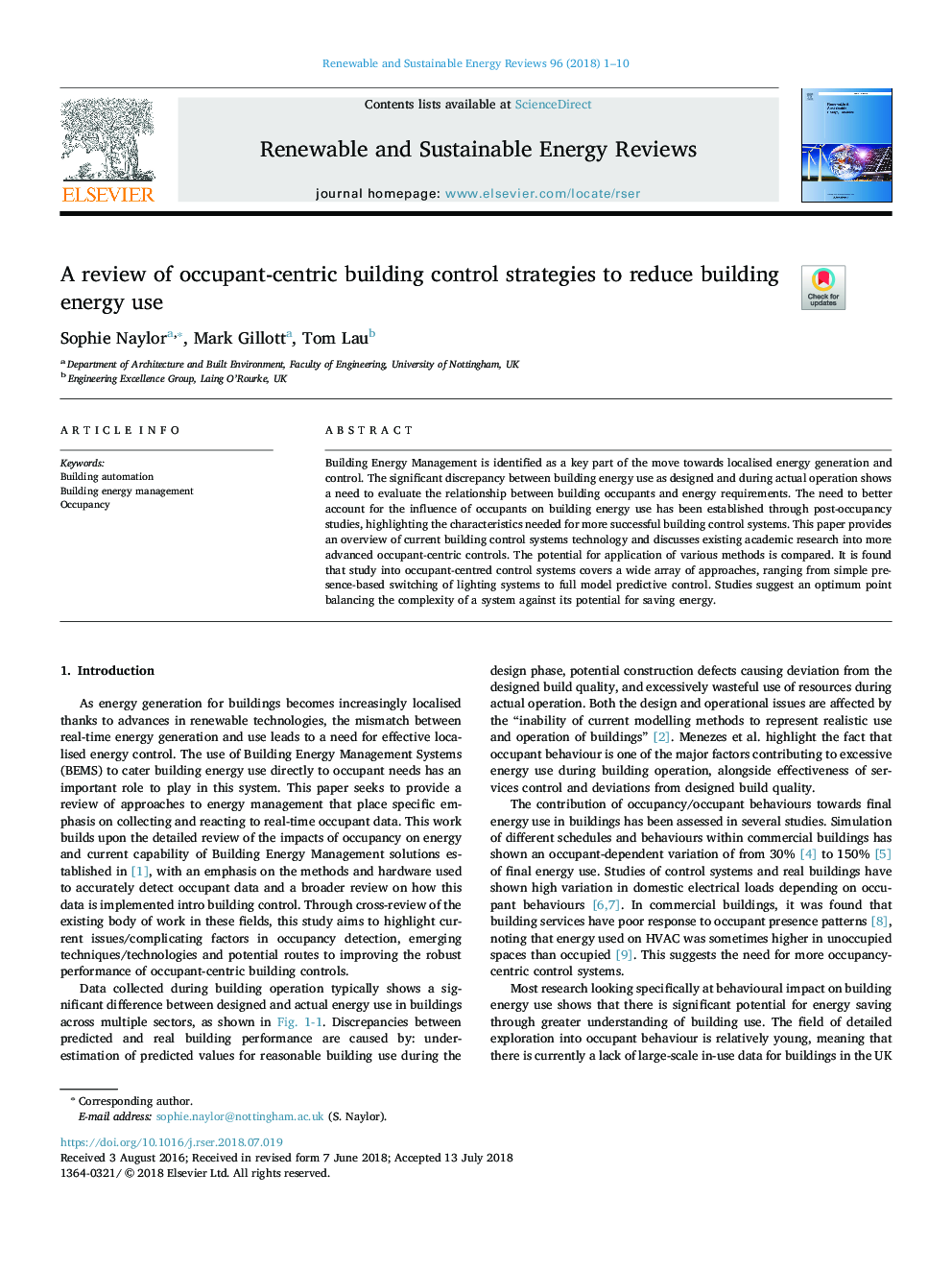| کد مقاله | کد نشریه | سال انتشار | مقاله انگلیسی | نسخه تمام متن |
|---|---|---|---|---|
| 8110159 | 1522288 | 2018 | 10 صفحه PDF | دانلود رایگان |
عنوان انگلیسی مقاله ISI
A review of occupant-centric building control strategies to reduce building energy use
ترجمه فارسی عنوان
بررسی استراتژی های ساختمان سازی محور محله به منظور کاهش مصرف انرژی ساختمان
دانلود مقاله + سفارش ترجمه
دانلود مقاله ISI انگلیسی
رایگان برای ایرانیان
کلمات کلیدی
اتوماسیون اداری، مدیریت انرژی ساختمان، تصرف،
ترجمه چکیده
مدیریت انرژی ساختمان به عنوان بخش مهمی از حرکت به سوی تولید و کنترل انرژی محلی تولید شده است. اختلاف قابل توجهی بین استفاده از انرژی ساختمان به عنوان طراحی شده و در طی عملیات واقعی نشان می دهد نیاز به ارزیابی رابطه بین ساکنان ساختمان و نیاز انرژی است. نیاز به حسابداری بهتر برای تأثیر ساکنان در استفاده از انرژی ساختمان از طریق مطالعات بعد از اشغال، مشخص شده است که ویژگی های مورد نیاز برای موفق تر ساخت سیستم های کنترل ساختمان را مشخص می کند. این مقاله خلاصه ای از تکنیک های سیستم های کنونی ساختمان را ارائه می دهد و تحقیقات علمی موجود را در کنترل های پیشرفته اشخاص محور می پردازد. پتانسیل کاربرد روش های مختلف مقایسه شده است. یافته شده است که مطالعه سیستم های کنترل کننده اشغالی، مجموعه ای گسترده ای از رویکردها را شامل می شود که از تغییرات ساده سیستم های نورپردازی به کنترل پیش بینی کننده کامل مدل در حضور حضور دارند. مطالعات نشان می دهد نقطه بهینه متعادل پیچیدگی یک سیستم در برابر پتانسیل آن برای صرفه جویی در انرژی است.
موضوعات مرتبط
مهندسی و علوم پایه
مهندسی انرژی
انرژی های تجدید پذیر، توسعه پایدار و محیط زیست
چکیده انگلیسی
Building Energy Management is identified as a key part of the move towards localised energy generation and control. The significant discrepancy between building energy use as designed and during actual operation shows a need to evaluate the relationship between building occupants and energy requirements. The need to better account for the influence of occupants on building energy use has been established through post-occupancy studies, highlighting the characteristics needed for more successful building control systems. This paper provides an overview of current building control systems technology and discusses existing academic research into more advanced occupant-centric controls. The potential for application of various methods is compared. It is found that study into occupant-centred control systems covers a wide array of approaches, ranging from simple presence-based switching of lighting systems to full model predictive control. Studies suggest an optimum point balancing the complexity of a system against its potential for saving energy.
ناشر
Database: Elsevier - ScienceDirect (ساینس دایرکت)
Journal: Renewable and Sustainable Energy Reviews - Volume 96, November 2018, Pages 1-10
Journal: Renewable and Sustainable Energy Reviews - Volume 96, November 2018, Pages 1-10
نویسندگان
Sophie Naylor, Mark Gillott, Tom Lau,
